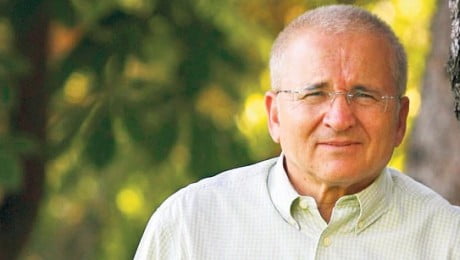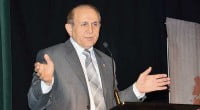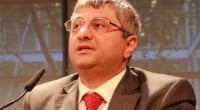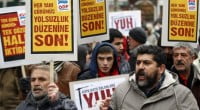Keyword: Turkey

Ex-AK Party deputy Özdalga: Gov’t wants to make judiciary subordinate to executive power
“The issue is not only about corruption, it is also about the independence of the judiciary and the separation of powers, things at the heart of the democratic regime. There is no democracy without these,” says Haluk Özdalga, who was a member of the ruling party since 2007 until his recent resignation.

Conspiracy theory par excellence [against Gülen movement]
That broad spectrum of people appears to be convinced that Islamic scholar Fethullah Gülen, who has advanced an interpretation of Islam in line with liberal modernity, and the faith-based social movement he has inspired, is to be blamed for all wrongdoing and crime that is going on in Turkey.

Erdogan’s corruption defense falls flat
Denying the corruption accusations that brought his party under a disconcerting spotlight, Turkish Prime Minister Recep Tayyip Erdogan has been lamenting press attempts to “throw the mud and see if it sticks.” He indirectly accused the judiciary of being taken over by the Fethullah Gulen religious movement, as well as acting as a subcontractor to foreign powers who, out of envy for Turkey’s political and economic success, manufactured this corruption plot to finish him off just as they tried to do at the Gezi Park protests in June.

Erdoğan isolates himself in power
Erdoğan is picky about journalists escorting him on board his official plane; he doesn’t like to see journalists asking annoying question around him anyway, but this time the criteria became really narrow. Umut Oran, Deputy Chairman of the main opposition Republican People’s Party (CHP) asked the prime minister about his criteria, since Erdoğan excluded most popular papers like Hürriyet, Zaman, Posta, or critical ones like Sözcü, Cumhuriyet, Radikal, and whether the travel expenses of journalists from pro-government papers would be covered on the government budget.

AK Party gov’t violates rule of law with mass profiling of civil servants
Profiling by the government — which a senior member of the ruling Justice and Development Party (AK Party) admitted to over Twitter — of some 2,000 senior public officials including police chiefs, prosecutors and judges as well as academics, journalists and business people is a violation of the constitution, analysts have said.

Prosecutor’s office launches investigation into Şahin’s claim
Şahin claimed that a high-level judge at the Supreme Court of Appeals had acted contrary to legal procedure and contacted Gülen before issuing his final verdict in the case against the businessman several years ago. “What should I do in this case?” asked the judge, according to the claims of the former justice minister. He went on to say that Gülen had allegedly told the judge to do “what justice requires.”

Operation against the Hizmet movement soon!
The AK Party government sees the corruption probes as a coup launched against it by the Hizmet movement and it has convinced itself that the probes are a defensive move in response to the effort to close prep schools. Already Erdoğan has presented movement supporters as spies and succeeded in dividing the state bureaucracy, families, friends and neighbors in the country. Unfortunately, this polarization in society is quite dangerous.

Tariq Ramadan says Erdoğan should practice what he preached to Mubarak
Prominent scholar Tariq Ramadan, grandson of the founder of the Muslim Brotherhood, has criticized the Turkish prime minister for seeking more power and urged him to rethink staying in power for a longer time. Ramadan said, Prime Minister Recep Tayyip Erdoğan once told former Egyptian President Hosni Mubarak — that one day he will have to know how to leave — is true for him as well. “[Erdoğan] also needs to get this right.”

Gülen, Hizmet, the state and the AKP
Gülen has placed much emphasis on education. With a new ijtihad (independent reasoning), he always stated that instead of building a mosque, religious businessmen must establish secular schools that will educate the future’s engineers, doctors, lawyers, journalists and yes, police, prosecutors and judges.

Koza Altın latest victim of government silencing political dissent
Gold mining company Koza Altın A.Ş., the owner of Bugün daily and Kanal Türk TV station, had its activities halted on Tuesday in Çukuralan goldfield, one of the company’s five major gold mines, in a move that has been perceived as the most recent example of the government’s exploitation of inspections and red tape to put pressure on those with critical views.

Turkey in 2014: Not too bright [Witch-hunt against Gulen Movement expected]
As I have written before, if there are bureaucrats who misuse their authority to serve the interest of the Gülen Movement, or any other entity, the government certainly has the right to fire them and bring them to justice. However, what Dilipak describes is a much larger scale witch-hunt, which can only violate many civil liberties and raise the tension in society to new heights.





















